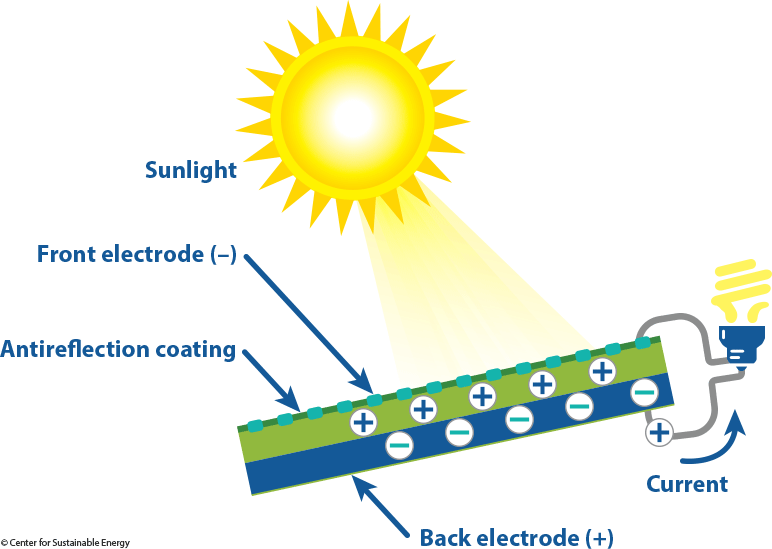
Many homeowners looking to buy solar panels are interested in understanding exactly how the technology works.
This makes sense since solar systems are quite a sizeable investment. Many want to know precisely when and how it will generate electricity (therefore savings) for them.
With that being said, it takes 24 hours for our Earth to rotate completely. This leaves us with one day and one night.
At any given moment, half the world is asleep, and the other half is awake and hustling and bustling.
But what about solar panels? Do they work at nighttime, or do they sleep like the rest of us?
Do solar panels work during nighttime?

In order to understand whether solar panels work at night or not, we have to know how they work in the first place.
Solar panels are capable of producing voltage or electric current through a phenomenon known as the photovoltaic effect.
In order for the photovoltaic effect to take place, a solar cell (or panel) needs to be exposed to photons (which is simply small bundles of electromagnetic radiation).
These photons are actually absorbed by the solar cell through two different types of semiconductors. The p-type and the n-type. These two semiconductors are joined together to create a p-n junction.
When you join these two types of semiconductors, you allow an electric field to be formed in the region of the junction as electrons move to the positive p-side and holes move to the negative n-side.
This electric field forces negatively charged particles to move in only one direction, the opposite for positively charged particles.
Without going into too much more detail, the whole reason for us explaining this process (briefly) is so that you understand that light (or photons) is needed in order for their energy to be transferred (eventually) into electricity.
Because of this, solar panels do not work at night. They require sunlight in order for the above process to take effect and, ultimately, to produce electricity.
Just in case you were curious, the photovoltaic effect was first discovered in 1839 by Edmond Becquerel.
Are solar panels more efficient during certain times of the day?
Now that you understand that sunlight is needed in order for the photovoltaic effect to take place, you may be wondering whether more sunlight means more electricity.
You would be wondering correctly as this is precisely the case.
Solar production is directly affected by the amount of solar irradiation hitting the panel at any given time.
We tend to measure this potential with peak sun hours.
A peak sun hour is one hour in which the solar irradiance (sunlight) reaches an average of 1,000 watts (W) of energy per square meter (roughly 10.5 feet).
The more peak sun hours your location receives, the more electricity your solar panel will produce.
Also, the location of the sun matters. This is why solar production is usually in line with the solar azimuth, with electricity production at its maximum between 11 am - 3 pm (peaking at 1 pm).
You can see an example of this below:

How to maximise your solar panel investment?
The best way to maximize your solar investment and have the quickest payback period would be to invest in the correctly sized solar system. Alongside this, you will want to make sure to take advantage of any solar tax rebates offered in your country.
In the U.S., for example, the current 2022 solar tax rebate is 26%. This means you get 26% of your solar system's cost paid back to you for investing in green technology.
With all this being said, solar panels are sometimes more worth it, depending on your location.
But a good rule of thumb is this. Suppose you live in an area that receives a lot of sunlight with expensive electricity utilities. Then investing in solar is almost always worth it.
The reason for this is that the savings you make will eventually pay for the solar system itself, leaving you with the ability to produce free electricity and ultimately save BIG!
For example, according to Climatebiz, "A 9.2 kW solar system in Arizona will save you $20,896 over a 13-year period, assuming you consume the monthly state average of 1,114 kWh. Your expected return on investment will be 12 years."
However, if you live in a location with less sunlight and very cheap electricity, you may not benefit that much from the savings, and thus your payback period will increase dramatically.
In these scenarios, homeowners tend to invest in solar beyond monetary reasons. One such reason is to live in a more sustainable manner by reducing one's home's carbon footprint.
Final thoughts
To date, solar panels do not work during nighttime. This is because they need sunlight in order for the photovoltaic effect to take place. Without it, no electricity will be produced.
However, investing in battery storage will see to it that all that electricity generated throughout the day, can be used at night and in the early morning (when consumption is often at its highest).
Additionally, battery storage will allow your home to have a backup source of electricity should a power outrage occur (which is becoming more and more frequent due to extreme weather events).
If you aren't set on investing in a full on battery backup system for your home, you could look into using solar generators as a go between.
The AC300 with its modular battery packs are capable of storing enough electricity to power your home for days.






































































